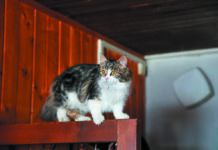Typical scenario in your home: Your cat lets out a yowl before biting the couch, abruptly shifts her focus to digging her claws into a nearby rug, then follows with a running leap onto the dining room table. You know it’s not the “Zoomies,” that sudden burst of energy many cats exhibit in the early evening hours, because your pet tears around the house throughout the day. Could it be Attention Deficit Hyperactivity Disorder (ADHD), a condition typically diagnosed in people who display restlessness, inattention, and impulsivity? Many cat owners have wondered.
But “the ASPCA does not currently have any insight or research that suggests cats can have ADHD,” says Samantha Nigbur-Mays, Animal Behavior Counselor, ASPCA Behavioral Sciences Team. “Cats that exhibit restlessness or increased vocalizations should be seen by a veterinarian to rule out any underlying medical conditions.”
Medical Reasons for ADHD-like behavior: Hyperthyroidism is the most frequent diagnosis for a cat’s hyperactive behavior. Cats with this condition have an increased metabolic rate that can send their behavior into overdrive. Appropriate testing by your veterinarian can determine if your pet has hyperthyroidism and if so, provide reliable treatment.
Other medical issues that have been linked to hyperactive behavior in cats include infections and allergies. A cat may want to outrun the incessant itchiness these conditions can cause. Again, a veterinarian can sort through the possibilities. If all medical reasons for a cat’s frequent hyperactivity are ruled out, behavioral reasons should be investigated.
Behavioral reasons for ADHD-like behavior: Cats that display hyperactive behaviors without a medical reason “may benefit from receiving increased enrichment in their daily lives,” says Ms. Nigbur-Mays. Along with introducing wands and electronic toys into a cat’s life, she recommends toys that mimic the movement of mice and birds. An entertained cat might be less inclined to release her energy haphazardly and seemingly randomly.
Teaching your cat tricks can help, too. Rewards in the form of tiny food morsels for performing a trick on cue (such as “Give me a high five!”) ensure that your cat has you for some company and also has something to occupy her active and inquisitive mind.





My female Calico 2 year old cat has never meowed. Her black long haired brother is very vocal. Is she just deferring all the communication to me from him?